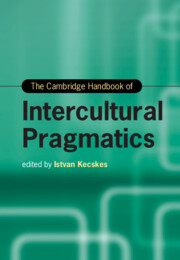Book contents
- The Cambridge Handbook of Intercultural Pragmatics
- Cambridge Handbooks in Language and Linguistics
- The Cambridge Handbook of Intercultural Pragmatics
- Copyright page
- Contents
- Figures
- Tables
- Acknowledgment
- Contributors
- Introduction The Rise of Intercultural Pragmatics
- Part I Theoretical Foundation
- Part II Key Issues in Intercultural Pragmatics Research
- 5 The Cultural, Contextual, and Computational Dimensions of Common Ground
- 6 Role of Context
- 7 (Mis/Non)Understanding in Intercultural Interactions
- 8 Creativity and Idiomaticity in Intercultural Interactions
- 9 Metaphors in Intercultural Communication
- 10 Common Ground in Linguistic Theory and Internet Pragmatics: Forms of Dynamic Multicultural Interaction
- 11 Vague Language from a Pragmatic Perspective
- 12 Humor in Intercultural Interactions
- 13 Emotion in Intercultural Interactions
- 14 Research Methods in Intercultural Pragmatics
- Part III Interface of Intercultural Pragmatics and Related Disciplines
- Part IV Intercultural Pragmatics in Different Types of Communication
- Part V Language Learning
- Index
- References
11 - Vague Language from a Pragmatic Perspective
from Part II - Key Issues in Intercultural Pragmatics Research
Published online by Cambridge University Press: 29 September 2022
- The Cambridge Handbook of Intercultural Pragmatics
- Cambridge Handbooks in Language and Linguistics
- The Cambridge Handbook of Intercultural Pragmatics
- Copyright page
- Contents
- Figures
- Tables
- Acknowledgment
- Contributors
- Introduction The Rise of Intercultural Pragmatics
- Part I Theoretical Foundation
- Part II Key Issues in Intercultural Pragmatics Research
- 5 The Cultural, Contextual, and Computational Dimensions of Common Ground
- 6 Role of Context
- 7 (Mis/Non)Understanding in Intercultural Interactions
- 8 Creativity and Idiomaticity in Intercultural Interactions
- 9 Metaphors in Intercultural Communication
- 10 Common Ground in Linguistic Theory and Internet Pragmatics: Forms of Dynamic Multicultural Interaction
- 11 Vague Language from a Pragmatic Perspective
- 12 Humor in Intercultural Interactions
- 13 Emotion in Intercultural Interactions
- 14 Research Methods in Intercultural Pragmatics
- Part III Interface of Intercultural Pragmatics and Related Disciplines
- Part IV Intercultural Pragmatics in Different Types of Communication
- Part V Language Learning
- Index
- References
Summary
This chapter presents a comprehensive review of vague language studies from a pragmatic perspective. An utterance is vague when it conveys unspecific meaning. For example, “Many friends attended her birthday party,” how many is many? 20, 100 or 200? Our interpretation of “many” may vary from individual to individual, from context to context. Vague language is fluid, stretchable, and strategic. It consists of various types, including approximators, vague quantifiers, placeholder words, vague category identifiers, general terms, intensifiers, softeners, and epistemic stance markers. This chapter serves as a guide for understanding the characteristics of vague language. The discussion involves the conceptual frameworks and features of vague language, which are illustrated by examples and research drawn from intercultural corpora. This chapter reviews the theorization of vague language, its linguistic categories and pragmatic functions, vague language use in intercultural communication, and includes suggestions for future research. Vague language plays a crucial role in intercultural communication and its pragmatic functions, such as mitigation, politeness, and self-protection, form an important part of the strategic moves used in effective language interactions. This chapter provides an important contribution to the field of intercultural pragmatics.
Keywords
Information
- Type
- Chapter
- Information
- The Cambridge Handbook of Intercultural Pragmatics , pp. 274 - 300Publisher: Cambridge University PressPrint publication year: 2022
References
References
Additional Resources
Theoretical frameworks relevant to VL:
Seminal work on VL:
VL works from the perspective of pragmatics:
VL works in intercultural pragmatics:
